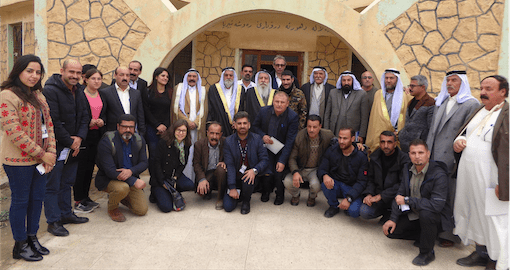FUNDING: Centre de Crise et de Soutien (CDCS – French Ministry for Europe and Foreign Affairs, France)
Between 2019 and 2023, Promediation’s work focused on the Sinjar district, an important transit route between northwestern Iraq and northeastern Syria, which has become a highly strategic zone involving local actors in Iraq, Turkey, the PKK (Kurdistan Workers’ Party), and other armed groups. The district was invaded by the Islamic State (ISIS) in 2014, leading to the capture of thousands of inhabitants, particularly Yazidis, who were subsequently enslaved. Despite the recognition of the Yazidi genocide by numerous governments and UN institutions, and a strong NGO presence in the district, living conditions remain difficult. In this multi-ethnic region, public services remain underdeveloped. More than 200,000 people remain displaced in the Kurdistan Region of Iraq (KRI).
Insecurity has increased, notably due to the undefined status of the area, known as the “disputed territories,” and the absence of a functional administration, as most of the Sinjar administration has been in exile since 2017. The process of liberating territories controlled by ISIS allowed various armed groups to establish themselves in the region, including PKK-affiliated forces and the Yazidi Protection Units (YPS), as well as the Popular Mobilization Forces (PMF – Shiite paramilitary groups). The escalation of Turkish military intervention against the PKK in northern Syria and Iraq, and the armed group’s violent reprisals, make the region uncertain, while political turmoil in Baghdad prevents a coherent state response. Finally, increased destabilization risks fueling ISIS activities, as the group remains active in the southern parts of the district along the Syrian-Iraqi border.
Promediation developed a program focused on the issue of governance in Sinjar and the restoration of an administration recognized as legitimate by all parties. After conducting consultation sessions with local actors to identify recommendations for stabilization, Promediation supported a national strategy for the region’s stabilization. The organization engaged in a unique dialogue process with the main stakeholders, namely local political and armed representatives, the Kurdish Regional Government (KRG), and the national government, as well as national security bodies. Despite a volatile political environment, most of these stakeholders agreed to open a dialogue process, but no converging interests have yet emerged among a highly divided field of actors, both locally and nationally.
Promediation maintained ties with the entire Yazidi community until 2023. Following consultations with over 140 Yazidis, conducted with the support of the International Organization for Migration (IOM), we supported an initiative for the creation of an official network of Yazidi civil society organizations (CSOs), addressing one of the community’s main demands: giving a marginalized population the capacity and space needed to promote its interests. This project is currently paused, pending further discussions with the authorities in Baghdad and Erbil during 2024.
